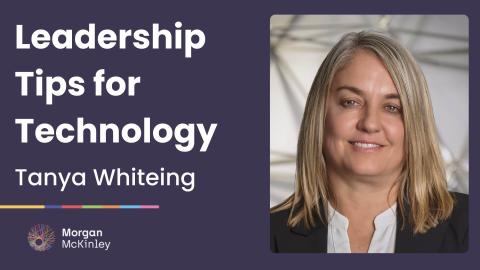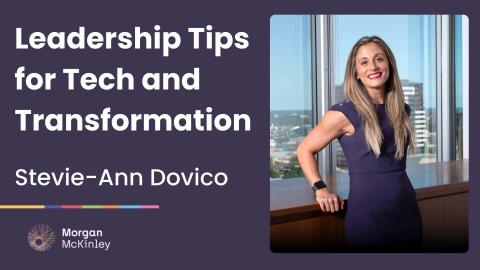Stand out and succeed: Leadership tips for Technology - Jennifer McArthur

As part of our ongoing commitment to our specialist communities, we interview accomplished leaders on a monthly basis to bring you insights on their career progression and advice that will help you progress your career further.

Jennifer McArthur has over 15 years’ experience in financial services working for global organisations such as Barclaycard and Standard Life.
She joined FNZ in July 2011 as a senior PMO Manager before transitioning into a Senior Project Management role, leading the delivery of one of the largest global projects in the FNZ Portfolio.
In 2015, Jen was promoted to the Group Head of Platform Conversions, leading a functional team of SMEs delivering large scale data migrations which deliver a critical component of FNZ’s strategic goals.
1. What factors do you think have been critical to the success you have achieved in your career?
I wouldn’t be where I am today without two things; mentorship and the ability to learn from failure. I have been incredibly fortunate to benefit from two strong female mentors who supported and guided me throughout my early career.
The word mentorship can mean many different things but for me it is as simple as someone to learn from, even by osmosis, someone that is aware of the impact they have on the people around them, someone who leads by example and is never too busy for a question or to provide advice.
In this new hybrid way of working, we are very much at risk of not providing the level of mentorship that was so critical to me in my early career, so I do think that it is something that we all need to dedicate some focus to. We have all received some form of mentorship in our career so we need to pay it forward.
There have been many times in my career where I have “failed” in the eyes of a manager, a project delivery, a personal goal or a client deliverable and if you let it, it can stop you in your tracks. Confidence is such a fickle thing, and it can easily be taken away leaving us unsure and full of doubt and that is never a platform for success. It wasn’t until I was in my 30s that I started to turn that around, started to see failure as a learning point and stopped letting it negatively impact progress.
Sure, I still beat myself up about it outside of work, turn it over constantly in my mind, let it feed my imposter syndrome - that is just human nature. However, there is nothing that will squash any feeling of insecurity or doubt better than success, so it is so critical to push through any failure (perceived or otherwise) and come back fighting.
2. What's the most valuable piece of advice you have received in your career and how did it help you?
It was actually a quote by Thomas A Knight “If you try, you might fail but if you don’t try, you will never succeed” that one of my old bosses was very fond of saying.
At first, I shrugged it off as a bit cringe, but that was youth. When I actually sat down and thought about it and how many things I hadn’t done through fear of failure I was a little angry at myself. We are all taught, directly or indirectly, that failure is a bad thing but is it really? Isn’t it a good thing to fail, learn from it and improve? If no one ever tried something for the first time through fear of failure then we would not have made the social, technological and medical advances that we have today.
I think we need to turn it around and see failure as a learning, a baseline to improve upon, not something to be so afraid of that you don’t even try. I always say to my team: ‘When you finish your day, ask yourself, “did I do everything in my power to succeed?” if the answer is Yes, then great repeat it, if the answer is No then learn from it and implement change the next day.’
Let’s take the word failure out of it and just look at the path to success.
3. What’s the most challenging situation you have faced in your career and how did you overcome it?
It will sound cliché, but it is a constant battle with imposter syndrome.
I am lucky to work in an environment where there are no barriers, there are no preconceived ideas of how much experience you need or what age / gender / race you need to be in order to be successful in a role. It is all about who is the best fit for a role and who will fight hardest to achieve that role.
That comes with massive benefits in that there is no limit on where you can go in your career if you do the work but it also comes with a lot of responsibility and a quick learning curve that can sometimes be intimidating. I have often found myself in a room with senior executive leaders thinking “what am I doing here” or “I can’t do this” but that is self-doubt creeping in again, self belief is so important in these situations.
I know I have worked hard to get where I am. I don’t know everything (and I never will) but I am open to learn, adapt and change to grow myself and my career. I shouldn’t see these people as better than me or more deserving than me, we are all equals with something to bring to the table and we can learn from each other.
So I stop, take a breath remember who I am and if that doesn’t work I have a list of all the things I have achieved in the note app on my phone, I give it a quick scan to boost my confidence and then I enter the situation as my best self, which is all anyone can ever ask for.
4. If you were starting your career now, what would you do differently?
In all honesty, nothing.
I haven’t had a straightforward path in my career. I actually always wanted to be a vet - since I was around five my heart was set on it. Unfortunately, due to personal circumstances, I didn’t achieve the grades I required for university in such a competitive field, so I spiralled as I had never even contemplated any other career. I took a year out, never went to university and have figured it out as I have gone from there.
Please don’t misunderstand me, I am not saying this is the right path for everyone or downplaying the importance of learning and university, only that university isn’t the only path.
I learned through experience and mentorship, took on more and more responsibility whenever I could and got to where I am today. The one thing I do want to change going forward is to focus on mentorship and women in technology initiatives. I think they are so critical to give women the opportunity to understand what possibilities are out there for them and to encourage them to try.
Most of us have c40 years in our working life, it's ok to try something for a year or two to help you make up your mind of what you want or more importantly what you don’t want. I would like to be part of that journey for someone and support them in the same way I was supported.














